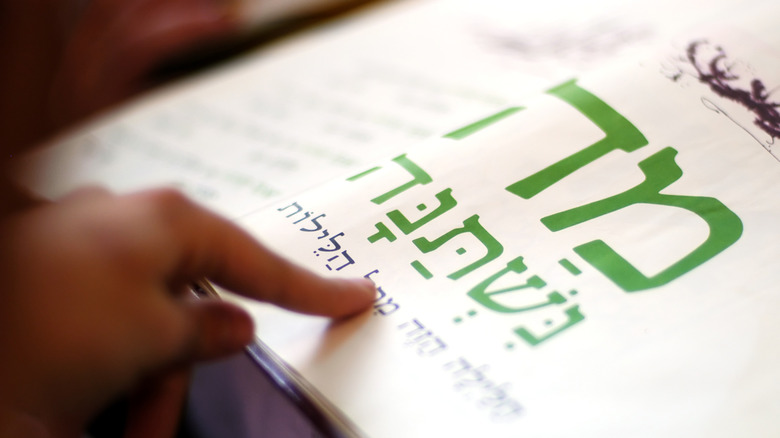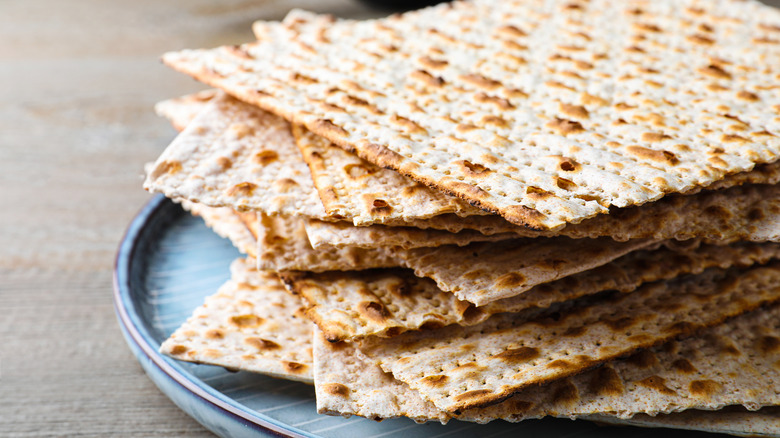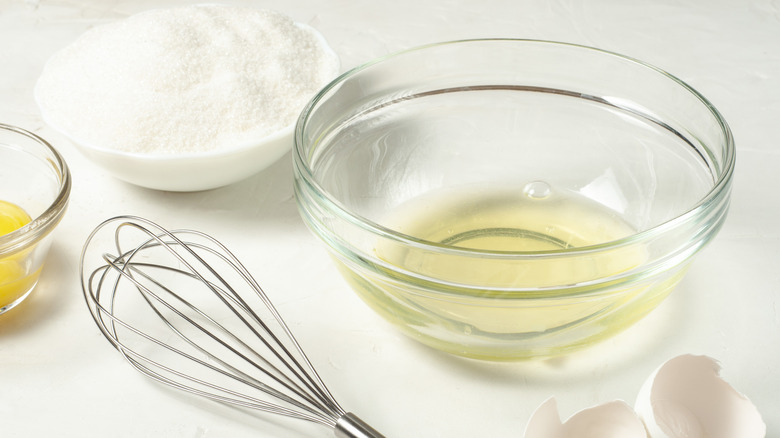The Only Substitution You Need For The Fluffiest Kosher Pancakes
Each Jewish holiday comprises traditions that may vary from household to household, but certain customs serve as common throughlines. During Hanukkah, for instance, it's par for the course to light a new candle on the menorah for each of the eight nights of the holiday, to symbolize each night that the Temple of Jerusalem lantern miraculously blazed with only a day's worth of oil. On Purim, you might see people dressed in costumes as they reenact a pivotal story in the Book of Esther, which recounts the survival of the Jews that were "marked for death by their Persian rulers" in the 5th century BCE, per Britannica.
Above all, food might be one of the most important aspects of any Jewish holiday tradition. This is true for Rosh Hashanah, when apples and honey are eaten to summon sweetness into the new year, and it's also true for Hanukkah, where treats like sufganiyot, a jelly-filled doughnut, might be flanked by savory dishes like latkes — or Yemenite malawach or Italian pollo fritto di Hanucca, depending on where you're from (via The Nosher). It's especially true on Passover, which is celebrated around a seder plate that represents the story of the Jews' liberation from Egyptian slavery, as relayed in the Haggadah. Come breakfast time, those keeping kosher for Passover (or any other time of year) needn't let flour and baking powder stand between them and a short stack of pancakes.
Bust out the matzo meal
There's no better post-holiday blessing than leftover matzo. The unleavened bread — which is a central part of the Passover seder, as it's modeled after the kind eaten by Jews fleeing Egypt, per NPR — is great on its own with a little salted butter, but it can do so many other cool tricks. Many families will make use of extraneous matzo with matzo brei, in which matzo gets broken up and fried with butter, milk, and eggs for a sweet or savory treat. If you're looking to mix things up this year, you can delegate those matzos to another skillet favorite: pancakes.
Commonly used as a term of endearment, the Yiddish word "bubaleh" also stands for a fluffy pancake often served around the holidays. Unlike matzo brei, NPR says bubaleh make use of whipped egg whites as a kosher rising agent. And just like the apples and honey which are eaten on Rosh Hashanah, the ingredients in bubaleh stand for more than just a tasty breakfast. "The matzo is a reminder of the affliction of slavery and the sugar, the sweetness of freedom," bubaleh enthusiast Alan Mishell tells NPR. "And we eat them together so that one is not remembered without the other."
Bubaleh for your bubaleh
Ready to start a new kosher breakfast tradition? Making bubaleh might be even easier than your standard batch of pancakes, as it doesn't involve measuring flour — a common pancake ingredient that is swapped out for matzo meal in accordance with Passover's unique dietary guidelines (via the Los Angeles Times). Alan Mishell shares his recipe, which has been in his family for three generations, with NPR. He calls for four to six eggs, a quarter cup of matzo meal (which you can make yourself by smashing matzo boards with a rolling pin, as Alison Roman does in a recipe for matzo ball soup), a quarter cup of sugar, and an eighth of a teaspoon of salt. The most labor-intensive part of the recipe is separating the egg whites from the yolks and whipping them to stiff peaks. Once that's done, grab your yolks and mix them in with your dry ingredients.
Fold the egg whites into the batter (be gentle; the air bubbles in the whites will give your pancakes height) and fry it in butter in one go, like you would any other giant pancake. Mishell sprinkles it with cinnamon, cuts it into wedges, and serves it with jam, syrup, and fruit.


